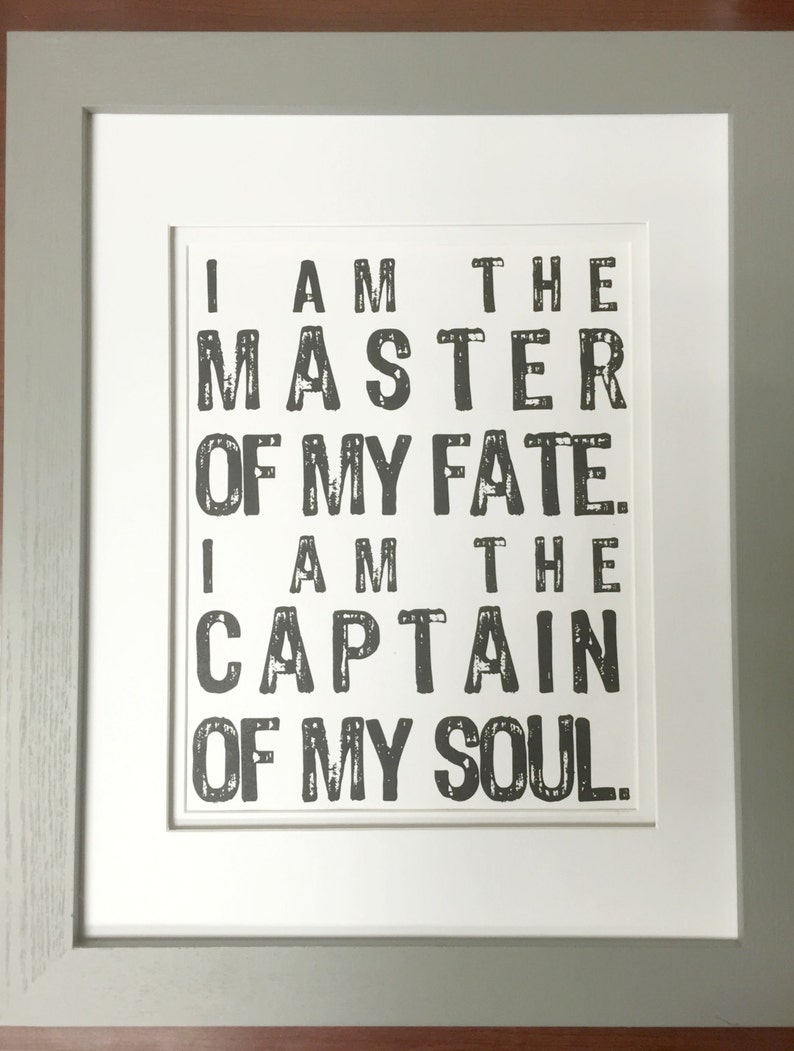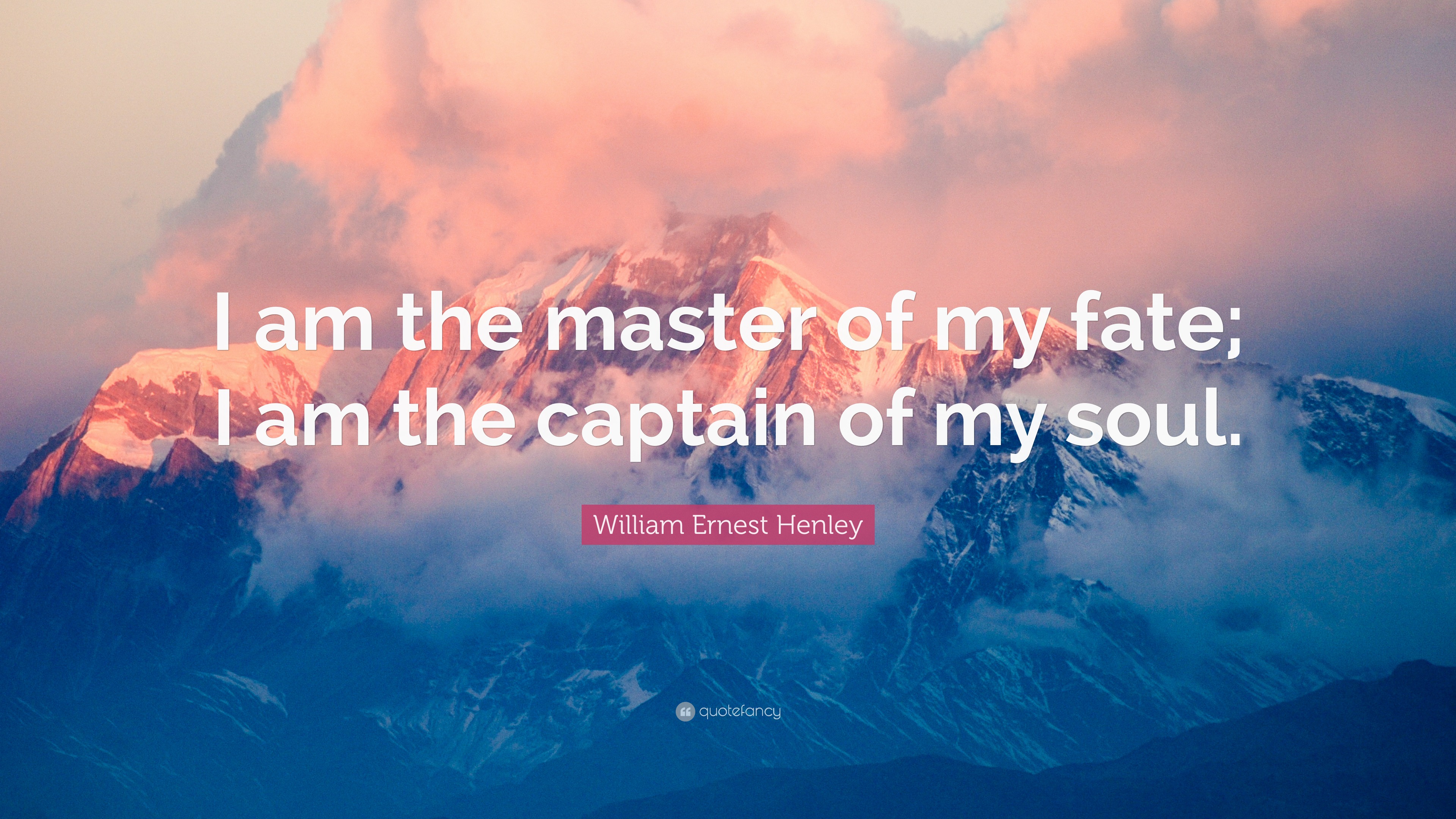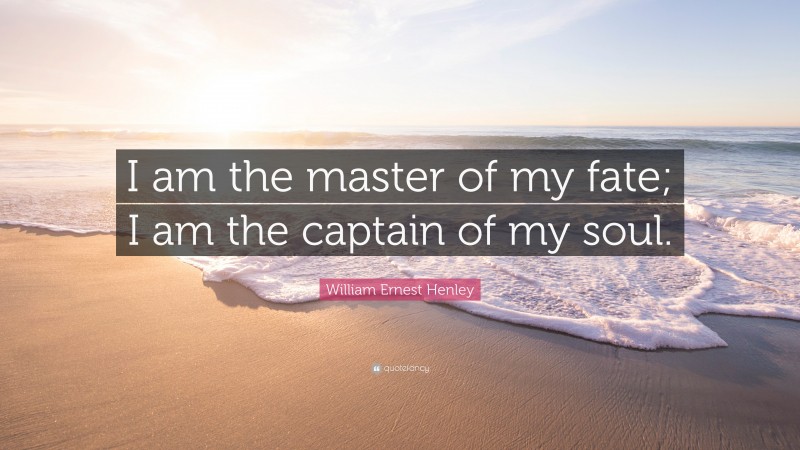

- #I am the master of my fate i am the captain of my soul how to#
- #I am the master of my fate i am the captain of my soul free#
It seems to me that while this response misses the point of the original poem, that each individual gets to decide how to respond to the things he can't control in this life, it teaches a bigger truth. Whitney, of the Quorum of the Twelve of many years ago, so regarded it and wrote a marvelous response using the same poetic meter and entitling his verse “The Soul’s Captain.” Through these many years, when I have been faced with difficult choices I have repeated these stirring words.īut on the other hand, it may sound arrogant and conceited in terms of the Atonement. It places upon the individual the responsibility for what he does with his life. Here's what President Hinckley had to say about it in his 2000 Christmas Devotional: He can be happy or sad, defiant or conquered, without reference to anyone else.

The poet is saying, you can send him to Heaven or Hell, it won't matter. Of course, a more accurate interpretation would be that it doesn't matter what circumstances life throws at us, we're the ones who get to decide how to react. No matter how bad death and the afterlife may be, it certainly can't be worse than living like this. In those times, thoughts like, "Life's lousy, and then you die" (expressed more elegantly in his third stanza) aren't scary at all. I've felt that way at times-like the world is pressing me down, and it's only my own will power that's keeping me going at all. It has a determined plodding rhythm, as if he's climbing a mountain one slow step at a time.

It goes against the idea that I get to be completely self-sufficient no matter what others think or do.As I was looking for poems quoted by President Faust, I found this one in a talk by President Hinckley. I know this goes against what the world preaches to us on a regular basis. Why? Because being in the center of God’s will, under his authority and rule, and his loving care is what we were created for. This theocentric idea is the key to living life to the fullest. God is the captain of all souls – “The LORD brings death and makes alive he brings down to the grave and raises up” (1 Samuel 2:6). God is the giver of fate – “I charge you in the presence of of God who gives life to all things… ” (1 Timothy 6:13). Though we can certainly strive, and should strive, toward being better at what we do, loving others well, seeking to improve in life, we must also realize that life is not ours to keep or to give. There is just one problem with the assertion that I get to determine my destiny…death!
#I am the master of my fate i am the captain of my soul free#
That folks is called the doctrine of Free Will, which asserts that not even God would force us to make decisions that are outside the realm of our personal choice. We can also safely assert that no one else makes decisions on our behalf. We can safely assert that the decisions we make lead to certain predictable outcomes. Those who walk through the straight, or narrow, gate will ultimately find eternal life, while those who choose the broad, or wide, gate will be led to final destruction.Ī short reflection on the juxtaposition of Jesus’ words and Henley’s then leads to one question…”Am I really the master of my own fate, and the captain of my soul?” At a certain level, yes.

In the context of the Gospel of Matthew, Christ is referring to ultimate eternal fate. Though Henley thanks “whatever gods may be” in his despair, his coined phrase is now used to appeal to one particular God: the self! Ironically, however, the first line of the 4th stanza of his poem “It matters not how strait the gate” appears to have been borrowed from Matthew 7:14, from Jesus’ sermon on the Mount. It is easy to see how the narrative of self-sufficiency, self-reliance, and self-adulation appeals to postmodern culture. Today, the famous line from his poem has been interlaced with postmodern thought as a new “mantra” for those who espouse the anthropocentric view that we are in control over our lives no matter what. Henley decided not to heed the medical advice given to him and sought the help of a renown english surgeon by the name of Joseph Lister who was able to save his leg from being amputated! While in recovery Henley wrote his poem as a testament to remaining resolute in the midst of adversity and trials. Henley wrote these now famous words while he received news his left leg might have had to be amputated due to complications from tuberculosis. William Ernest Henley, an English poet who lived in the 1800s crafted a small poem with the famous quip, “I am the master of my fate captain of my soul.” This phrase is the last stanza of his famous poem known as Invictus:įor my unconquerable soul.


 0 kommentar(er)
0 kommentar(er)
